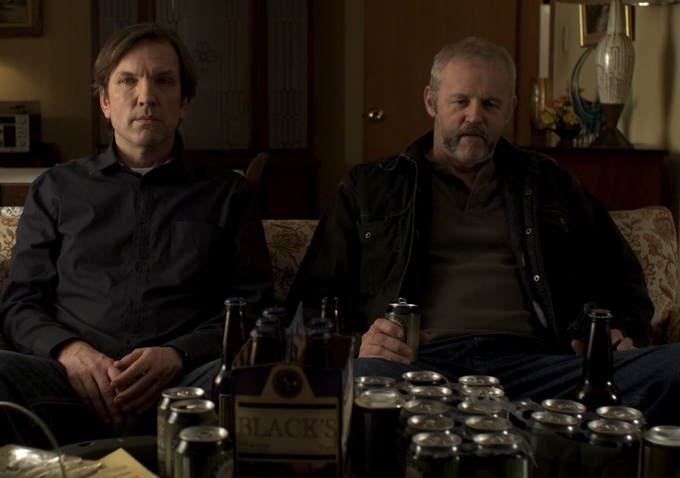 Playwright Robert Longfellow, the lead character in “Collaborator,” is a familiar New York intellectual struggling to produce honest work. Despite notably lucrative side gigs as a Hollywood screenwriter for hire, he hasn’t lived up to what the (fake) Times loudly declared him to be, a once-hypothetical “the voice of a generation.” His latest play, “American Excursion,” was a flop, and if you really need to know more about that play beyond the title, then you probably don’t recognize the sweater-vest frou-frou type here personified by writer, director and star Martin Donovan.
Playwright Robert Longfellow, the lead character in “Collaborator,” is a familiar New York intellectual struggling to produce honest work. Despite notably lucrative side gigs as a Hollywood screenwriter for hire, he hasn’t lived up to what the (fake) Times loudly declared him to be, a once-hypothetical “the voice of a generation.” His latest play, “American Excursion,” was a flop, and if you really need to know more about that play beyond the title, then you probably don’t recognize the sweater-vest frou-frou type here personified by writer, director and star Martin Donovan.
Our only time spent in New York is a silent shot of Donovan, collar high, walking through an implausibly-empty Times Square. Lost in thought, he’s strikingly handsome in this milieu, as Donovan the director takes great pains to shoot Donovan the actor as a young Dylan, despite the fact that “American Excursion” probably isn’t Blonde On Blonde and the Times Square Longfellow inhabits has an ESPN Zone and a “True Blood” billboard, of which young Dylan thankfully had no familiarity.
 His wound-licking retreat from this downcast city is sunny LA, where he visits his mother in his childhood home, yet he seems conspicuously uncomfortable and lost here, as if this was unfamiliar terrain. He’s looking to find some gravity by caring for his elderly mother, though his discomfort noticeably clashes with his mother crouching in her bedroom praying with army photos in the background. Though his mother is appropriately doting, she slowly reveals she deserves better than the three parts concern, one part condescension with which he treats her, gently mocking her down-home wisdom with a wry, shit-eating grin.
His wound-licking retreat from this downcast city is sunny LA, where he visits his mother in his childhood home, yet he seems conspicuously uncomfortable and lost here, as if this was unfamiliar terrain. He’s looking to find some gravity by caring for his elderly mother, though his discomfort noticeably clashes with his mother crouching in her bedroom praying with army photos in the background. Though his mother is appropriately doting, she slowly reveals she deserves better than the three parts concern, one part condescension with which he treats her, gently mocking her down-home wisdom with a wry, shit-eating grin.
It doesn’t hurt that this also gives the married Longfellow a chance to reconnect with his former lover Emma, a respected screen actress played with striking class by Olivia Williams. Unfortunately, before he can reconnect with her extensively, he runs into old neighbor Gus. Despite being in his fifties, Gus still lives at home with his mother, spending his days as a casual drunk consistently in trouble with the law. When he comes face-to-face with Longfellow, he refers not to their age difference, but to the fact that he was in the twelfth grade while Longfellow was in the seventh.
Gus, who considers Longfellow “Hollywood,” unfortunately needs a friend, and he can’t help but intrude on Longfellow’s hopes for silence and serenity. He guilts Longfellow into a get-together under the guise of catching up, though this pot-fueled reunion is just a front for Gus’ attempt to escape police custody. As cops converge on the duo, Gus drunkenly takes his old friend hostage, creating a theater-ready two-man show, both characters fueled by endless boozing.
 Underneath Gus’ fascination with big city glamour is a noted contempt and jealousy towards Longfellow’s profession. As played by veteran David Morse, Gus is a ball of conservative rage, claiming he only knows Longfellow’s plays because “people” call him a “Commie.” Morse is an actor of enormous intelligence, and it’s hard to figure out whether Gus’ brief bits of self-awareness are inconsistent with his general uncouthness, or the sign of an intelligent actor poking through a dim character. While Longfellow is nervous, he also finds an uneasy safety in this intellectual one-on-one. The two begin to play acting games, and Longfellow is both terrified and flattered that he’s found such an unbiased collaborator. Hey, that’s the title!
Underneath Gus’ fascination with big city glamour is a noted contempt and jealousy towards Longfellow’s profession. As played by veteran David Morse, Gus is a ball of conservative rage, claiming he only knows Longfellow’s plays because “people” call him a “Commie.” Morse is an actor of enormous intelligence, and it’s hard to figure out whether Gus’ brief bits of self-awareness are inconsistent with his general uncouthness, or the sign of an intelligent actor poking through a dim character. While Longfellow is nervous, he also finds an uneasy safety in this intellectual one-on-one. The two begin to play acting games, and Longfellow is both terrified and flattered that he’s found such an unbiased collaborator. Hey, that’s the title!
As a director, Donovan is respectful enough to allow actors moments to shine. A veteran of stage and screen, his sympathies clearly lie with the former, as “Collaborator” has a stagey sensibility that does no favor to the eye, but flatters the actors. It’s unfortunate that Donovan’s performance is mostly glib and sarcastic, his every line delivery underlined by a cutting condescension that suggests Longfellow feels he’s above even a Valley hostage situation. Gus is noticeably damaged, and it’s fascinating to see Longfellow use this to his ego’s advantage, making “Collaborator” a sometimes-intriguing character study, but Longfellow is too singular a personality to make this cat-and-mouse game indicative of anything other than one isolated culture clash. [C]

